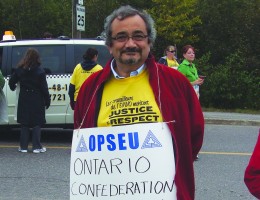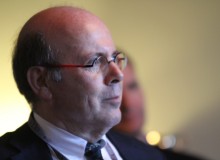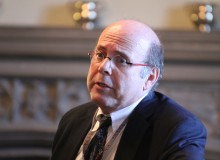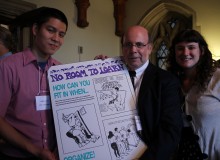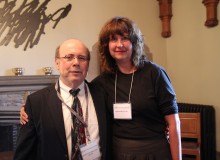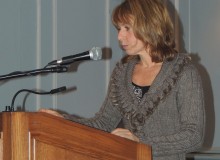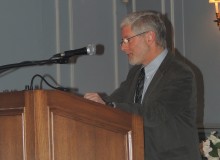
OCUFA Today and Tomorrow
Today, half a century after its creation, OCUFA has become the central voice for faculty in Ontario, and an advocate for high-quality, accessible post-secondary education. Although many of the issues facing the province’s university sector seem to have changed little since the 1960s — including affordability, accessibility, support for both research and teaching, adequate public funding, and more — other challenges have begun to command more of OCUFA’s attention as it enters its second half-century.
These challenges include the needs of the ever-expanding number of contract and part-time faculty, increasing faculty workload and job-related stress, and pension reform. OCUFA is also focused on the complex issues of institutional differentiation and the push for “program rationalization,” as governments seek yet another way to trim university budgets and ask the system to do more with less.
Kate Lawson
Changing times, evolving priorities
These new challenges — and as-yet unforeseen challenges that are sure to arise in the coming years — will clearly demand that OCUFA keep adapting to the needs of Ontario’s post-secondary sector and the professors and librarians who work within it.
Although advocacy has always been a key role for the organization, in recent years OCUFA has begun having a greater voice in the public realm, as it seeks to educate and inform all Ontarians about the quality and sustainability of the province’s higher-education system. OCUFA’s “We Teach Ontario” campaign, for example, promotes the important connection between teaching and research in the province’s universities through highlighting the research of featured professors.
OCUFA President, Executive Director, and staff in front of OCUFA’s office at 17 Isabella Street, Toronto, October 2014. Front row: Mark Rosenfeld (Executive Director), Andrea Calver; second row (left to right): Donna Gray, Karen Wheeler, Kimiko Inouye, Lisa Alexis; third row (left to right): Erica Rayment, Brynne Sinclair-Waters, Gail McCaughey; back row (left to right): Russell Janzen, Graeme Stewart, Kate Lawson (President). Missing: Karat TenBrinke.
The OCUFA at 50 History Project thanks the following individuals
and organizations for their assistance in creating this exhibit:Lisa Alexis
Deborah Flynn
Kate Lawson
Carol J. Anderson
Melissa Goldstein
Doug Lorimer
Paul Axelrod
Donna Gray
Joyce Lorimer
Helen Breslauer
Craig Heron
Ed Monahan
Glen Brown
John Holmes
Graham Murray
Alan Brunger, Trent University
Tess Hooks
Michael Piva
Glen Copplestone
Michiel Horn
Connie Reid, OCADU
Rebecca Coulter
Geoffrey Hudson, NOSMFSA
Mark Rosenfeld
Helene Cummins
Russ Janzen
Graeme Stewart
Michael Doucet
Glen Jones
Karen Suurtamm, University of Toronto Archives
Howard Epstein
Mark Langer
Aniko Varpalotai
Mark Langer, President of OCUFA, 2009–11, supports striking faculty during the Northern Ontario School of Medicine Faculty and Staff Association (NOSMFSA) strike, Thunder Bay, 2010.
One area where I think OCUFA’s really indispensable is government lobbying. Faculty associations just don’t have the resources to speak on a regular basis, formally and informally, to the Minister of Training, Colleges and Universities, for example. OCUFA does. It has ongoing relationships with the province’s key educational, political, social, and economic bodies and then transmits essential
information to the local level.Current OCUFA President, 2013–15
Kate Lawson
OCUFA will continue its important advocacy and service roles, including support for members’ collective bargaining and the grievance process. But it will also be critical to be creative in our public engagement, not only with those in the university community but as well with the broader public, in order to offer alternatives to increasingly narrow conceptions of higher education.
OCUFA Executive Director, 2011 to present
Mark Rosenfeld
Our Status of Women Committee is a place where I personally feel that we can make change in the lives of our female faculty colleagues and librarians in a very real and involved way at the level of policy. And for that, first and foremost, I think OCUFA is absolutely outstanding.
Chair, Status of Women Committee, 2014
Helene Cummins
They’re a supportive body and they give us a supportive framework, things like how to
navigate the system politically when we have questions, how to deal with program prioritization, things like that. They link us to other faculty associations, and other key players in the university system. So they’re very much a threshold of knowledge, a network to lead us to others who can assist us.Chair, Status of Women Committee, 2014
Helene Cummins
I think the other role that was always positive was OCUFA’s ability to share and compare information. And the fact that we can make reference to OCUFA at the bargaining table. I think that is really important.
Former Board member, Finance Committee member, OCUFA
John Holmes
We’re advocating to preserve and promote our members’ concerns — financial, economic, professional concerns. But it goes beyond that. We’re also advocating for a conception of higher education which I think the majority of the membership still share: of a high-quality, affordable, accessible higher education system in which there’s still respect for liberal arts, there’s still respect for the sciences, there’s still a respect for professions. And not only respect, but that those areas are supported and seen as fundamental to a higher education system.
OCUFA Executive Director, 2011 to present
Mark Rosenfeld
Videos
Photos
- OCUFA’s President Mark Langer speaks at Henry Mandelbaum’s retirement party, June 2011. Photo courtesy Joel Duff.
- Henry Mandelbaum at his retirement party, June 2011. Photo courtesy Joel Duff.
- Henry Mandelbaum’s retirement party, June 2011. Photo courtesy Joel Duff.
- Henry Mandelbaum at his retirement party, June 2011. Photo courtesy Joel Duff.
- Staff members Donna Gray and Lisa Alexis at Henry Mandelbaum’s retirement party, June 2011. Photo courtesy Joel Duff.
- Henry Mandelbaum’s retirement party, June 2011. Photo courtesy Joel Duff.
- Henry Mandelbaum at his retirement party, June 2011. Photo courtesy Joel Duff.
- Mike Yam (Canadian Federation of Students–Ontario), Henry Mandelbaum, and Nora Loreto (Canadian Federation of Students–Ontario) at Henry Mandelbaum’s retirement party, June 2011. Photo courtesy Joel Duff.
- Henry and Thea Mandelbaum at his retirement party, June 2011. Photo courtesy Joel Duff.
- Henry Mandelbaum on the picket line with striking librarians and archivists at the University of Western Ontario, fall 2011. Photo courtesy Rebecca Coulter.
- Striking faculty members at the Northern Ontario School of Medicine Faculty and Staff Association (NOSMFSA), Thunder Bay, 2010.
- Striking faculty members at the Northern Ontario School of Medicine Faculty and Staff Association (NOSMFSA), Thunder Bay, 2010.
- Deborah Flynn, a former OCUFA President, speaks at Henry Mandelbaum’s memorial, February 8, 2013.
- Executive Director Mark Rosenfeld speaks at Henry Mandelbaum’s memorial, February 8, 2013.






